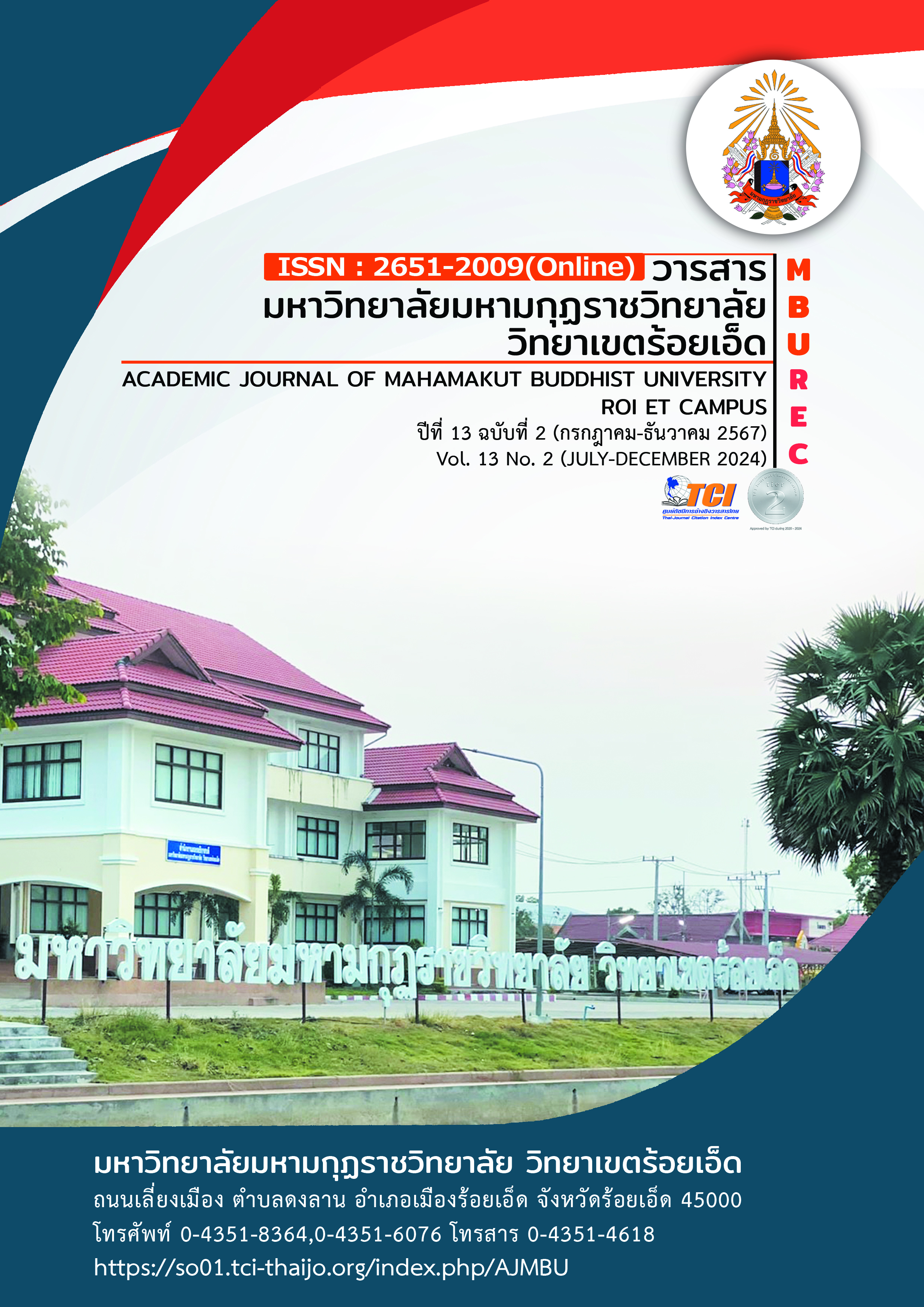THE DEVELOPMENT OF UNPLUGGED CODING LEARNING ACTIVITIES TO PROMOTE COMPUTATIONAL THINKING FOR PRIMARY 1 STUDENTS
Main Article Content
Abstract
The objectives of the research article were: 1) to develop learning activities with unplugged coding to promote computational thinking. For grade 1 students with a performance of 70/70 criteria. 2)to compare computational thinking for grade 1 students learning with unplugged coding with the criteria of 70 percent, and 3) to study the satisfaction of Prathomsuksa 1 students towards learning activities with unplugged coding. The sample group used in this research were 43 students in Prathomsuksa 1/2, semester 2, academic year 2022, Phrakumarn Mahasakham School. The research tool was a computational thinking test. satisfaction questionnaire developed by the researcher The data were analyzed by percentage, mean, and standard deviation. One-Sample Mean Parametric Test t-test.
The results of this study found that: 1) Learning with non-computer programming unplugged coding to promotes computational thinking for students in Grade 1 above the threshold of 70 percent. 2) Comparison of computational thinking for grade 1 students who received learning activities with unplugged coding higher than the threshold of 70 percent, and 3) The overall satisfaction of Prathom Suksa 1 students towards learning activities with unplugged coding was at the highest level.
Article Details

This work is licensed under a Creative Commons Attribution-NonCommercial-NoDerivatives 4.0 International License.
References
ฉัตรพงศ์ ชูแสงนิล. (2563). แนวคิดเชิงคำนวณ (Computational Thinking). สืบค้นเมื่อ 21 มีนาคม 2566. จาก https://www.scimath.org/lesson-technology/item
ทรงสมร คชเลิศ. (2543). ความพึงพอใจในการเรียนกลุ่มวิชาการเลขานุการของนักเรียนระดับ ประกาศนียบัตรวิชาชีพวิทยาลัยพณิชยการธนบุรีและวิทยาลัยพณิชยการเชตุพน. สารนิพนธ์ปริญญาการศึกษามหาบัณฑิต. บัณฑิตวิทยาลัย : มหาวิทยาลัยศรีนครินทรวิโรฒประสานมิตร.
ประภัสสร สำลี. (2564). การพัฒนาชุดกิจกรรมการเรียนรู้แบบ Unplugged Coding เพื่อเสริมสร้างทักษะการคิดด้านวิทยาการคำนวณ สำหรับนักเรียนชั้นอนุบาลปีที่ 3. วารสารวิจัยและนวัตกรรมสถาบันอาชีวศึกษากรุงเทพมหานคร. 4(2). 181-198.
ประภาส เกตุแก้ว. (2546). ความพึงพอใจของผู้ใช้บริการที่มีต่อการให้บริการของฝ่ายทะเบียนรถ
สำนักงานขนส่งจังหวัดประจวบคีรีขันธ์. สารนิพนธ์ปริญญาการศึกษามหาบัณฑิต.
บัณฑิตวิทยาลัย : มหาวิทยาลัยศรีนครินทรวิโรฒ.
ปลูกปัญญา. (2563). UNPLUGGED CODING : โมเดลทักษะแห่งอนาคต สำหรับเด็กปฐมวัย. สืบค้นเมื่อ 23 มีนาคม 2566. จาก http://plookpanya.ac.th
ผนวกเดช สุวรรณทัต. (2562). Coding คืออะไร ใน ศิริเดช สุชีวะ. กรุงเทพมหานคร : คณะครุศาสตร์ จุฬาลงกรณ์มหาวิทยาลัย.
ภาสกร รองเรือง. (2563). แนวคิดเชิงคำนวณร่วมกับรูปแบบการเรียนรู้ Coding เพื่อส่งเสริมทักษะการแก้ปัญหาแบบร่วมมือ. วารสารวิชาการเครือข่ายบัณฑิตศึกษามหาวิทยาลัยราชภัฏภาคเหนือ. 11(1). 1–16.
โรงเรียนพระกุมารมหาสารคาม. (2564), รายงานผลการประเมินตนเองของสถานศึกษาโรงเรียนพระกุมารมหาสารคาม ประจำปี 2564. มหาสารคาม : ฝ่ายวิชาการ โรงเรียนพระกุมารมหาสารคาม.
วิไลพร คุโณทัย. (2530). หลักการสอน. กรุงเทพมหานคร : กรมการฝึกหัดครู.
สถาบันส่งเสริมการสอนวิทยาศาสตร์และเทคโนโลยี. (2560). คู่มือการจัดการเรียนรู้รายวิชาพื้นฐาน วิทยาศาสตร์ (วิทยาการคำนวณ). สืบค้นเมื่อ 25 มีนาคม 2566. จาก https://www.scimath.org/ebook-technology/item/8376-2560-2551
สถาบันส่งเสริมการสอนวิทยาศาสตร์และเทคโนโลยี. (2562). คู่มือการใช้หลักสูตร เทคโนโลยี (วิทยาการคำนวณ) กลุ่มสาระการเรียนรู้วิทยาศาสตร์ (ฉบับปรับปรุง พ.ศ.2560) ระดับประถมศึกษาและมัธยมศึกษา. กรุงเทพมหานคร : โรงพิมพ์คุรุสภาลาดพร้าว.
สุวิมล นิลพันธ์. (2564). การจัดกิจกรรมการเรียนรู้แบบ Unplugged เพื่อพัฒนาทักษะการคิดเชิง
คำนวณ เรื่อง รูปสี่เหลี่ยม ของนักเรียนชั้นประถมศึกษาปีที่ 5. วารสารบัณฑิตศึกษา
มหาวิทยาลัยราชภัฏวไลยอลงกรณ์ในพระบรมราชูปถัมภ์. 15(2). 208–223.
Barefoot, C A.S. (2014). Computational thinking. Retrieved 25 March 2023. From https://barefootcas.org.ukwpcontent/uploads/2014/10/Computational-thinking-Barefoot-Computing.pdf
Kim, B., Kim, T., & Kim, J. (2013). Paper-and-pencil programming strategy toward computational thinking for non-majors: Design your solution. Educational Computing Research. 49(4). 437–459.


